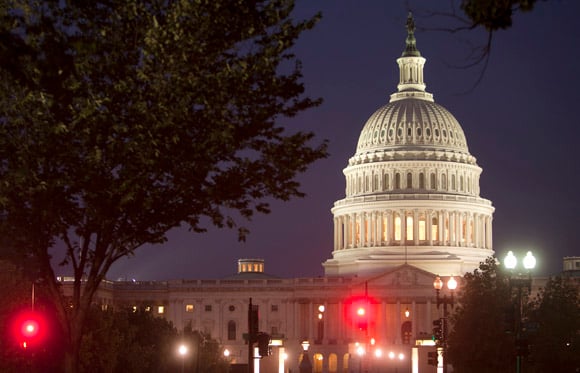New restrictions on insider-trading by U.S. lawmakers are needed to help lift waning public trust in Congress.
New restrictions on insider-trading by U.S. lawmakers are needed to help lift waning public trust in Congress, said Democrats and Republicans on the House Financial Services Committee.
“This is about restoring faith,” said Representative Tim Walz, a Minnesota Democrat sponsoring legislation to explicitly ban such trading. “If you think 9 percent approval rating is bad, don't do anything, drag it out and watch what happens,” he said referring to polling on Americans' approval of Congress.
There's a public perception that lawmakers are benefiting from non-public information whether they are or not, he said.
Previous efforts to pass restrictions haven't advanced in Congress. The issue re-emerged after a report last month by the CBS News program “60 Minutes,” which said members of Congress bought stock in companies during debates on legislation that might affect the businesses.
None of the questioned investments was illegal, the report said.
“It is absolutely essential that we do restore the public's trust,” said Representative Spencer Bachus, an Alabama Republican and chairman of the financial services panel. “If this is the answer, so be it.”
Bachus was among the lawmakers mentioned in the “60 Minutes” report. The program said that during the 2008 financial crisis, Bachus -- then the ranking Republican on the Financial Services Committee -- bet stock prices would fall while being privately briefed that a global financial meltdown might be imminent.
Reporting Requirement
In a statement at the time, Bachus's office said he never trades on non-public information.
The CBS report sparked interest by lawmakers in legislation first introduced in 2006 by Representative Louise Slaughter, a New York Democrat. That measure was re-introduced this year by Walz. It would label as securities fraud any trading on legislative information by lawmakers or their staff members. The bill would require any trade of more than $1,000 to be reported within 90 days.
The bill would require regulators to draft rules barring individuals and so-called political intelligence firms, which use their contacts in Washington to provide financial firms with market-related information, from selling non-public information obtained from federal employees. It also would require firms or individuals involved in political intelligence to register in the same way as federal lobbyists.
‘First Step'
“We're living in a time when Americans do not trust Congress,” said Representative Walter Jones, a North Carolina Republican co-sponsoring the measure. “It is a proper first step in maintaining the integrity of Congress.”
The Senate's Homeland Security Committee is examining bipartisan proposals to restrict certain trading by lawmakers and their aides, who often have access to nonpublic information as part of their legislative and oversight duties.
The chairmen of the House and Senate panels said they would move ahead with the measures and bring them to a committee vote.
Representative Sean Duffy, a freshman Republican from Wisconsin, said the measure should go a step further. He introduced legislation that would require members of Congress to establish a blind trust for all of their stock holdings. If they don't, lawmakers would have to disclose their stock trades within three days.
“There is a cloud over members of Congress and the trades they make,” he said. “The American people want sunshine.”
--Bloomberg News--







